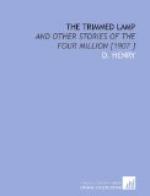Around the corner of the park strolled one of those new-crop, smooth-faced young policemen that are making the force more endurable—at least to the eye. He saw a woman with an expensive fur coat, and diamond-ringed hands crouching down against the iron fence of the park sobbing turbulently, while a slender, plainly-dressed working girl leaned close, trying to console her. But the Gibsonian cop, being of the new order, passed on, pretending not to notice, for he was wise enough to know that these matters are beyond help so far as the power he represents is concerned, though he rap the pavement with his nightstick till the sound goes up to the furthermost stars.
A MADISON SQUARE ARABIAN NIGHT
To Carson Chalmers, in his apartment near the square, Phillips brought the evening mail. Beside the routine correspondence there were two items bearing the same foreign postmark.
One of the incoming parcels contained a photograph of a woman. The other contained an interminable letter, over which Chalmers hung, absorbed, for a long time. The letter was from another woman; and it contained poisoned barbs, sweetly dipped in honey, and feathered with innuendoes concerning the photographed woman.
Chalmers tore this letter into a thousand bits and began to wear out his expensive rug by striding back and forth upon it. Thus an animal from the jungle acts when it is caged, and thus a caged man acts when he is housed in a jungle of doubt.
By and by the restless mood was overcome. The rug was not an enchanted one. For sixteen feet he could travel along it; three thousand miles was beyond its power to aid.
Phillips appeared. He never entered; he invariably appeared, like a well-oiled genie.
“Will you dine here, sir, or out?” he asked.
“Here,” said Chalmers, “and in half an hour.” He listened glumly to the January blasts making an Aeolian trombone of the empty street.
“Wait,” he said to the disappearing genie. “As I came home across the end of the square I saw many men standing there in rows. There was one mounted upon something, talking. Why do those men stand in rows, and why are they there?”
“They are homeless men, sir,” said Phillips. “The man standing on the box tries to get lodging for them for the night. People come around to listen and give him money. Then he sends as many as the money will pay for to some lodging-house. That is why they stand in rows; they get sent to bed in order as they come.”
“By the time dinner is served,” said Chalmers, “have one of those men here. He will dine with me.”
“W-w-which—,” began Phillips, stammering for the first time during his service.
“Choose one at random,” said Chalmers. “You might see that he is reasonably sober—and a certain amount of cleanliness will not be held against him. That is all.”
It was an unusual thing for Carson Chalmers to play the Caliph. But on that night he felt the inefficacy of conventional antidotes to melancholy. Something wanton and egregious, something high-flavored and Arabian, he must have to lighten his mood.




